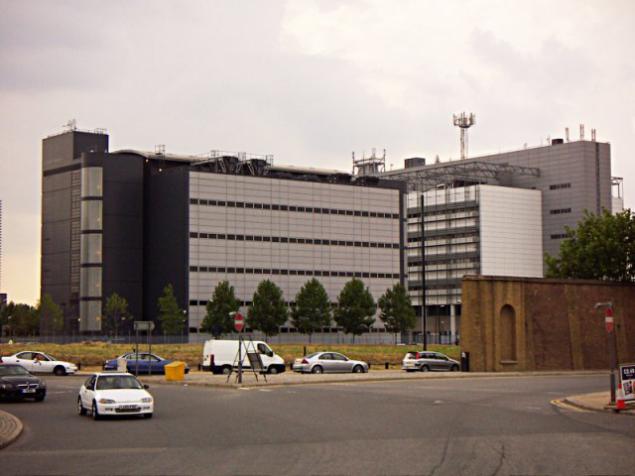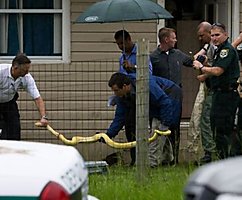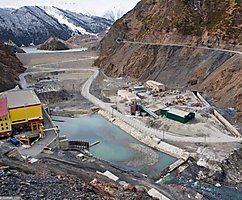Is it possible to "switch off" the Internet?
 Bashny.Net
Bashny.Net
Breaking setMozhet whether the Internet ever be disabled or even killed? Chris Baranyuk studies that could lead to such consequences.

Internet adamant. At least we hope so. That is why when our computer virus attack or something else goes wrong, we joke - the "end of the internet." It's just a modern hyperbole. But can we really, literally, kill the Internet? And if so, anyone really knows for sure what will happen next?
"A massive attack on the Internet is actually possible to destroy", - says Vincent Chan, MIT.
Part of the answer can be found in the London Docklands area in a large unremarkable building. Its gray walls are surrounded by a metal fence with video cameras. No billboards or signage explaining to passersby that this building is and to whom it belongs. But there is one of the largest Internet sites. It is called «Linx», London Internet Exchange, and it is one of the largest traffic exchange points in the world.

In fact, you will be able to disrupt the Internet, if you can take or destroy it, and about 30 of the same buildings around the world.
"This kind of doomsday scenario is not very likely, but possible. Such objects are very well protected - says Jack Waters, technical director of one of the network providers, which are of great importance because of their large networks form the backbone of the Internet. - We have monitored everywhere, we take all necessary precautions. This is a very protected objects. There have been no one was able to disrupt any such site ».
Perhaps the loss of communication between these places - an easier way to "break" the Internet? There are countless kilometers of cable, "wrapped" around the globe, and many of them are simply without protection, often under water. Indeed, sometimes the cables are broken just randomly, for example, during an earthquake. It is believed that the major failures of the Internet in 2008, including in Egypt, occurred because of the broken wires.
Distributed ustoychivostOdnako consequences of accidents in the physical infrastructure of the network are not as far reaching as you might think, because they are offset by the stability of the original design of the entire system. For this we must thank people like Paul Baran, an American engineer of Polish origin. Baran is one of those few people who are still in the early 1960s developed a communication network so as to enable them to withstand even a nuclear attack.

That is why a cable break or destruction of the data center does not affect the vulnerability of the network as a whole. Even off entire countries, such as Syria, can not completely restrict the internal network communications in Syria - although, of course, access to external Web sites such as Google, would be difficult or impossible.
In the end, people realized that the ability to redirect Internet traffic can be used against the network itself. One of the options - distributed denial of service (DDoS-attack), in which a huge flow of traffic deliberately sent to the server, which can not cope with the overload. DDoS-attacks are becoming more and more common, and they are one of the main threats. However, a network with a huge capacity, can simply absorb the "bad" traffic and redirect it so that the government sites, while remaining under attack, yet continue to function. But the problem is compounded each year.
Violation granitsDrugoy serious problem is BGP-hijacking. BGP means "border gateway protocol." This is a key system, which indicates the direction of packets of Internet traffic. For a long time it was believed that BGP-routers located at various points of the network, packets are always sent in the correct direction. However, in recent years it has proved that traffic can be seamlessly routed. This "theft" would mean that the vast amounts of data can be stolen or monitored by third parties such as intelligence services or hackers.
"While most of these issues are known to cause a crash, and some of them, in theory, and the" failure "of the Internet - yet has never had a chance to shut down the entire Internet. This does not mean that we should forget about such a possibility, "- says Vincent Chan, a professor at MIT.
Worst case, "I think that a massive attack to bring down the entire Internet is actually possible", - says Professor Chang. He notes that physical attacks on the Internet infrastructure are unlikely to cause permanent damage, "Destruction of one node in a network of 1000 does not bring down the whole network. But what if there is a software vulnerability that affects all 1000 nodes? Then we have a problem ».
Chan believes that there may be willing to attack the Internet in this way. But the consequences of the collapse of the Internet can not imagine it. "I think it must be open discussion about the offense and defense on the Internet - says Chan. - It has never been seriously discussed ».
Dark setBanki, trade, public systems, personal communication, household appliances - is very much in the modern world is connected to the Internet. Local, suspension of operation of the network - nothing more than a nuisance. But if the Internet really "fall," we will find ourselves in big trouble.
The real problem, however, is that we do not know exactly how it will be serious. Danny Hillis, a pioneer of Internet technology, pointed this out audience at the TED conference in 2013.
"Nobody knows exactly how far the Internet has penetrated into our lives - he commented. - We have no idea what will be the consequences of an effective denial of service ».
via www.bbc.com/future/story/20150310-how-to-break-the-internet

Internet adamant. At least we hope so. That is why when our computer virus attack or something else goes wrong, we joke - the "end of the internet." It's just a modern hyperbole. But can we really, literally, kill the Internet? And if so, anyone really knows for sure what will happen next?
"A massive attack on the Internet is actually possible to destroy", - says Vincent Chan, MIT.
Part of the answer can be found in the London Docklands area in a large unremarkable building. Its gray walls are surrounded by a metal fence with video cameras. No billboards or signage explaining to passersby that this building is and to whom it belongs. But there is one of the largest Internet sites. It is called «Linx», London Internet Exchange, and it is one of the largest traffic exchange points in the world.

In fact, you will be able to disrupt the Internet, if you can take or destroy it, and about 30 of the same buildings around the world.
"This kind of doomsday scenario is not very likely, but possible. Such objects are very well protected - says Jack Waters, technical director of one of the network providers, which are of great importance because of their large networks form the backbone of the Internet. - We have monitored everywhere, we take all necessary precautions. This is a very protected objects. There have been no one was able to disrupt any such site ».
Perhaps the loss of communication between these places - an easier way to "break" the Internet? There are countless kilometers of cable, "wrapped" around the globe, and many of them are simply without protection, often under water. Indeed, sometimes the cables are broken just randomly, for example, during an earthquake. It is believed that the major failures of the Internet in 2008, including in Egypt, occurred because of the broken wires.
Distributed ustoychivostOdnako consequences of accidents in the physical infrastructure of the network are not as far reaching as you might think, because they are offset by the stability of the original design of the entire system. For this we must thank people like Paul Baran, an American engineer of Polish origin. Baran is one of those few people who are still in the early 1960s developed a communication network so as to enable them to withstand even a nuclear attack.

That is why a cable break or destruction of the data center does not affect the vulnerability of the network as a whole. Even off entire countries, such as Syria, can not completely restrict the internal network communications in Syria - although, of course, access to external Web sites such as Google, would be difficult or impossible.
In the end, people realized that the ability to redirect Internet traffic can be used against the network itself. One of the options - distributed denial of service (DDoS-attack), in which a huge flow of traffic deliberately sent to the server, which can not cope with the overload. DDoS-attacks are becoming more and more common, and they are one of the main threats. However, a network with a huge capacity, can simply absorb the "bad" traffic and redirect it so that the government sites, while remaining under attack, yet continue to function. But the problem is compounded each year.
Violation granitsDrugoy serious problem is BGP-hijacking. BGP means "border gateway protocol." This is a key system, which indicates the direction of packets of Internet traffic. For a long time it was believed that BGP-routers located at various points of the network, packets are always sent in the correct direction. However, in recent years it has proved that traffic can be seamlessly routed. This "theft" would mean that the vast amounts of data can be stolen or monitored by third parties such as intelligence services or hackers.
"While most of these issues are known to cause a crash, and some of them, in theory, and the" failure "of the Internet - yet has never had a chance to shut down the entire Internet. This does not mean that we should forget about such a possibility, "- says Vincent Chan, a professor at MIT.
Worst case, "I think that a massive attack to bring down the entire Internet is actually possible", - says Professor Chang. He notes that physical attacks on the Internet infrastructure are unlikely to cause permanent damage, "Destruction of one node in a network of 1000 does not bring down the whole network. But what if there is a software vulnerability that affects all 1000 nodes? Then we have a problem ».
Chan believes that there may be willing to attack the Internet in this way. But the consequences of the collapse of the Internet can not imagine it. "I think it must be open discussion about the offense and defense on the Internet - says Chan. - It has never been seriously discussed ».
Dark setBanki, trade, public systems, personal communication, household appliances - is very much in the modern world is connected to the Internet. Local, suspension of operation of the network - nothing more than a nuisance. But if the Internet really "fall," we will find ourselves in big trouble.
The real problem, however, is that we do not know exactly how it will be serious. Danny Hillis, a pioneer of Internet technology, pointed this out audience at the TED conference in 2013.
"Nobody knows exactly how far the Internet has penetrated into our lives - he commented. - We have no idea what will be the consequences of an effective denial of service ».
via www.bbc.com/future/story/20150310-how-to-break-the-internet
Tags
See also
6 COMMANDMENTS Joseph Brodsky to read EVERYONE
Six Commandments of Joseph Brodsky
Six Brodsky Commandments
How to uproot stumps on the plot
Testosterone in a man's life
20 little-known facts about the human body
Last minute ruin Sony laptops
Energy
Dispelling the "medical" myths
Such are the terrible consequences is getting enough sleep ... I would not joke so with your health!

















